According to Maslow’s hierarchy of needs, sleep is one of the basic requirements for human beings, so sleeping has an essential role in our lives. In case of deprivation of sleep, many diseases and stress break out in the human body and mind. That’s why, for a healthy body and mind, every person should sleep at least 8 hours a day.
Sleep problems and irregular sleeping hours may cause abnormal weight gain, skin problems, and dark under-eye bags. To avoid these problems, having regular and quality sleeping habits is very substantial. Sleep survey questionnaires are a kind of source for learning people’s sleeping habits that are mostly used for psychological research. In this article, you will learn what sleep surveys are used for and see various types of questions under different categories for your next analysis.
What is a sleep survey?
A sleep survey is a type of survey that includes questions about people’s sleeping routines. These surveys are generally conducted by mental health specialists, doctors, psychiatrists, and psychology professors. Many physical and mental illnesses can be caused by sleep deprivation or poor sleep. For this reason, sleep questionnaires are used to collect information about the sleep patterns of both healthy and unhealthy people.
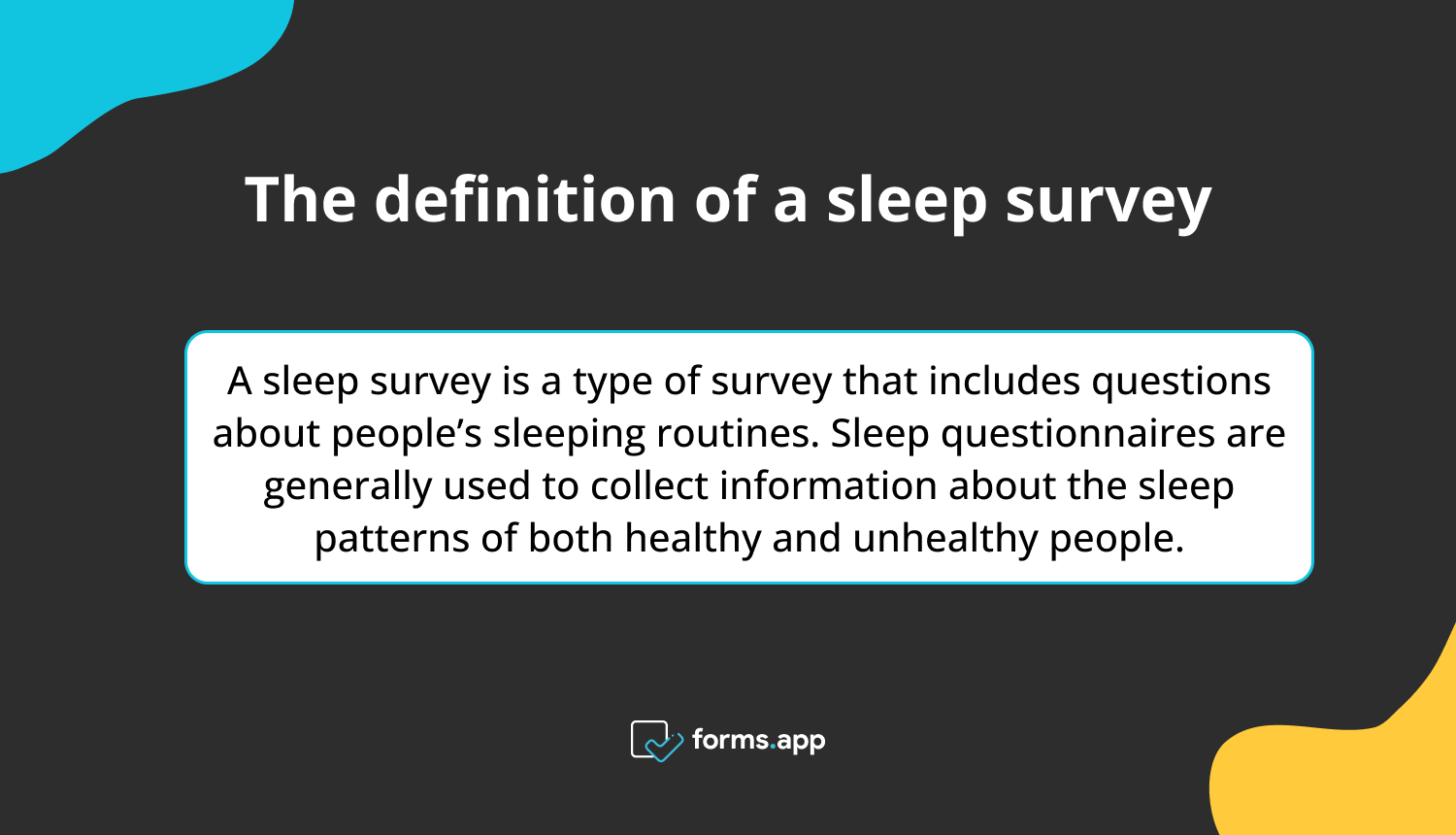
45 Amazing sleep survey questions to conduct a successful research
If you are an expert who wants to research sleep routines and the causes of poor sleep, deciding which questions you should include in the survey may be challenging. For best results, you should examine the respondents' answers in a very detailed way. In addition, it is an important feature to have various question types to keep respondents' interest alive. We have divided sleep questionnaire questions into 5 different categories, so you can benefit from the following question types according to your needs.
Survey questions about sleeping habits
Habits are an area in our lives that we usually get used to with difficulty and have a hard time quitting. In case of any stress or anxiety disorder, the first habit we leave is sleep. For this reason, you should definitely include questions about sleep habits in your research.
Disclaimer: The sleep survey questions provided in this article are for example purposes only and are not intended for diagnosis, treatment, or professional evaluation. These questions are meant to inspire those creating health-based surveys. If you are experiencing any sleep issues, please seek help from a qualified professional.
1. How long does it take you to fall asleep?
a - As soon as I close my eyes.
b - Within 15 minutes
c - Within 30 minutes
d - Within 1 hour
e - It can even take hours.
2. Does the presence of sound and light affect your sleep?
a - Always
b - Very often
c - Sometimes
d - Rarely
e - Never
3. Do you go to bed at the same time every night?
a - Always
b - Very often
c - Sometimes
d - Rarely
e - Never
4. Do you need a special item for sleeping?
a - Yes
b - No
5. Do you have trouble sleeping anywhere other than your bed?
a - Always
b - Very often
c - Sometimes
d - Rarely
e - Never
6. Do you have trouble waking up?
a - Always
b - Very often
c - Sometimes
d - Rarely
e - Never
7. Is there a sleeping position you particularly like? If so, what is it?
a - Yes (A new answer box should appear for those who say yes.)
b - No
8. Do you have a video that you like to listen to/watch while you sleep?
a - Yes
b - No
9. Is your average sleep time the same every day?
a - Always
b - Very often
c - Sometimes
d - Rarely
e - Never
Survey questions about sleep quality
Every person may be sleeping enough to sustain his life, but the quality of sleep plays an equally vital role as the time of sleep. A few hours of quality sleep may be equivalent to long hours of poor-quality sleep. For people who say they get enough sleep but don't feel healthy and energized, you can include these sleep quality survey questions in your research to understand their problems.
10. Does where you sleep affect your sleep quality?
a - Always
b - Very often
c - Sometimes
d - Rarely
e - Never
11. Is it difficult for you to wake up in the morning?
a - Always
b - Very often
c - Sometimes
d - Rarely
e - Never
12. Does the choice of pillow affect your sleep?
a - Yes
b - No
13. Is your sleep often interrupted?
a - Yes
b - No
14. Can you sleep at regular hours?
a - Always
b - Very often
c - Sometimes
d - Rarely
e - Never
15. What range are your sleeping hours in general?
a - 10 P.M. - 07 A.M.
b - 01 P.M. - 08 A.M.
c - 02 A.M. - 12 P.M.
d - 06 A.M. - 03 P.M.
16. Do you often experience uninterrupted sleep?
a - Always
b - Very often
c - Sometimes
d - Rarely
e - Never
17. Are you exposed to devices such as television and telephone before sleep?
a - Always
b - Very often
c - Sometimes
d - Rarely
e - Never
18. Do you consume drinks containing caffeine before going to sleep at night?
a - Always
b - Very often
c - Sometimes
d - Rarely
e - Never
Survey questions about dreams & nightmares
One of the leading causes of people's sleep problems is dreams or, worse, nightmares. According to Mayo Clinic, nightmares are often caused by psychological causes such as anxiety, stress, and trauma. On the other hand, dreams are visuals that help you preserve your memories and make sense of your emotional attitudes. Although it is normal to dream every night, remembering every dream is quite tiring for the human brain.
19. How often do you have bad dreams?
a - Always
b - Very often
c - Sometimes
d - Rarely
e - Never
20. To what extent does dreaming affect your daily life?
a - Not at all
b - Not that much
c - Partly
d - Somewhat
e - Totally
21. Do you feel you can control your dreams?
a - Yes
b - No
22. Do you feel that you are losing your sense of reality due to dreams?
a - Not at all
b - Not that much
c - Partly
d - Somewhat
e - Totally
23. How often do you dream?
a - Every night
b - Every two days
c - Once a week
d - Once a month
e - Once in a six month
24. Do you remember your dreams or nightmares after you wake up?
a - Always
b - Very often
c - Sometimes
d - Rarely
e - Never
25. Do you dream of an event that you experienced during the day?
a - Always
b - Very often
c - Sometimes
d - Rarely
e - Never
26. Are the people in your nightmares people you know?
a - Always
b - Very often
c - Sometimes
d - Rarely
e - Never
27. Do you have dreams about your past traumatic experiences?
a - Always
b - Very often
c - Sometimes
d - Rarely
e - Never
Survey questions about sleep deprivation
Sleep deprivation is also one of the important categories you should include in your research. As you can understand from the name, sleep deprivation means having trouble sleeping, and this deprivation can cause problems in people's daily lives. You can add the following questions to your survey to understand the root of the problem.
28. Could you rate your sleep time?
a - Very poor
b - Poor
c - Good
d - Very good
e - Excellent
29. In spite of having sufficient sleep, do you ever feel exhausted during the day?
a - Always
b - Very often
c - Sometimes
d - Rarely
e - Never
30. What would make your nighttime sleep more pleasant? Please explain.
31. Do you take any medical pills to sleep?
a - Yes
b - No
32. Do sound and light affect your sleep?
a - Yes
b - No
33. Are there any activities you do to sleep? Please explain.
34. Does being stressed affect your sleep hours?
a - Always
b - Very often
c - Sometimes
d - Rarely
e - Never
35. Do you have strict rules about your sleeping and waking times?
a - Not at all
b - Not that much
c - Partly
d - Somewhat
e - Totally
36. What do you do to sleep again on the nights you can't sleep?
a - Try to sleep
b - Play a game
c - Surf on social media
d - Listen to a podcast/music
e - Watch a film/series
Survey questions about sleeping disorders
All sleep-related diseases that occur during sleep can be called sleep disorders. These disorders often negatively affect your sleep quality and have a negative impact on your life. In addition, disorders such as snoring and sleepwalking can disturb not only you but also your partners. The following questions may be included in your research to ask patients suffering from these disorders.
37. Does anyone in your family have a sleep disorder?
a - Yes
b - No
38. Do you routinely take any nutritional supplements or drugs for sleep?
a - Yes
b - No
39. Do you consume a lot of caffeine and alcohol in your daily life?
a - Always
b - Very often
c - Sometimes
d - Rarely
e - Never
40. Do you have any health problems? Please explain. (e.g., asthma, heart, and lung diseases)
41. Do you have a problem with your mental health? Please explain
42. Do you have irregular working hours? (e.g., night shifts, flexible working hours)
a - Always
b - Very often
c - Sometimes
d - Rarely
e - Never
43. On average, how often do you get up at night because of sleep disorders?
a - Always
b - Very often
c - Sometimes
d - Rarely
e - Never
44. Do you have difficulty falling asleep or staying asleep?
a - Not at all
b - Not that much
c - Partly
d - Somewhat
e - Totally
45. Do you experience any unusual symptoms while trying to fall asleep (e.g., rapid breathing, racing thoughts)?
a - Not at all
b - Not that much
c - Partly
d - Somewhat
e - Totally
Conclusion
In short, Sleep is one of the most basic necessities we need in our lives. Sleep deprivation and poor sleep also reduce the quality of life for many people because they generally feel fatigued and sluggish during the day. For this reason, sleep is a need that should be given importance, and people who suffer from sleep disorders should consult doctors about any problem.
Using the examples of questions above, both doctors and experts can contribute to their research and uncover the root cause of sleep problems. If you would like to create a sleep survey questionnaire, start with forms.app’s one of the ready-made templates, and share it with the respondents!
Ebru is an Outreach Operations Specialist and content writer at forms.app. Writing is her passion, particularly on topics such as eCommerce, social media, customer engagement, surveys, and online forms. During her free time, Ebru enjoys watching movies and exploring new destinations.
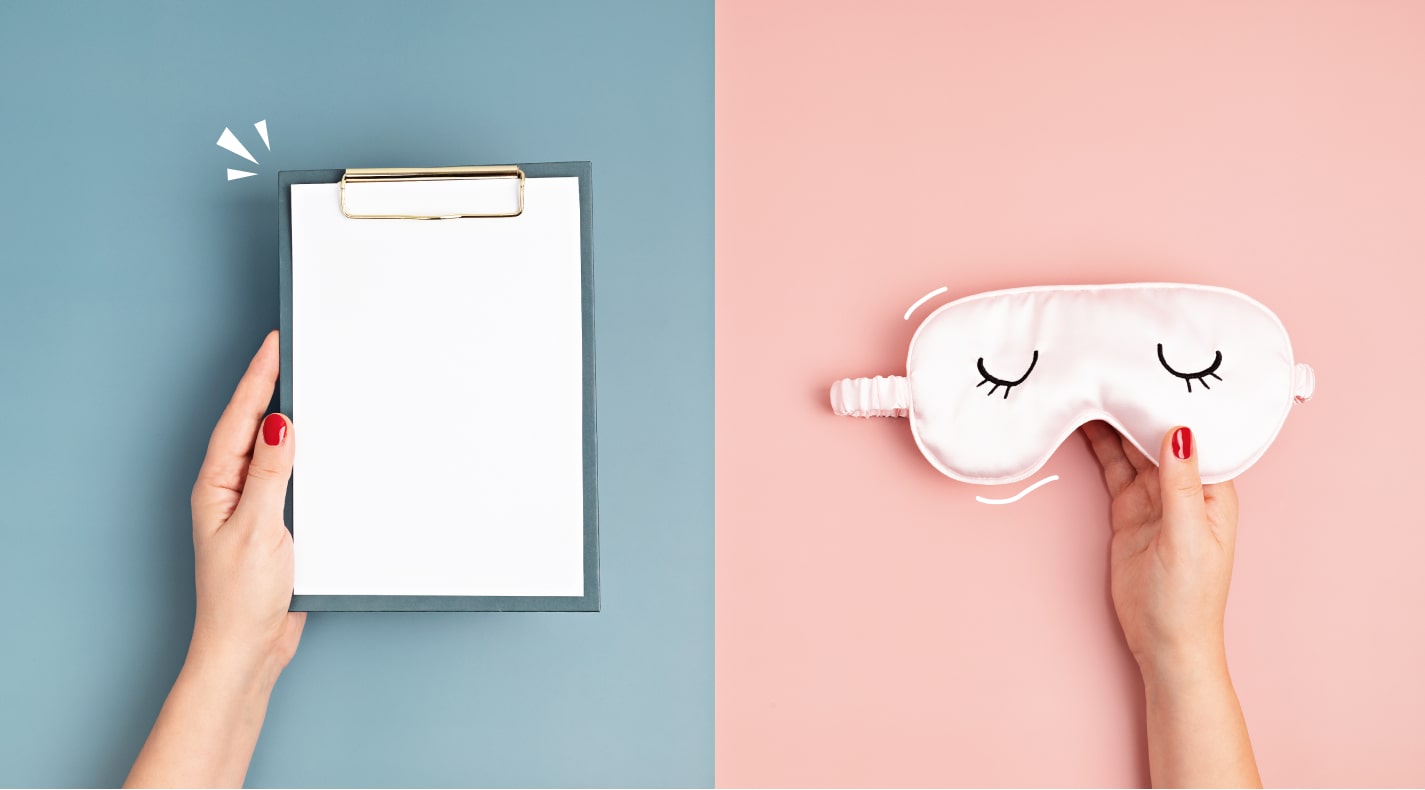
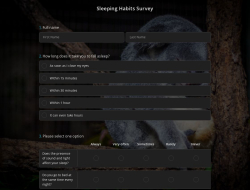
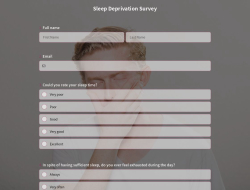
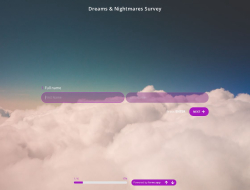
![150+ Fun poll questions for any event [2025 edition]](https://file.forms.app/sitefile/100_fun_multiple_choice_poll_questions_1.webp)

